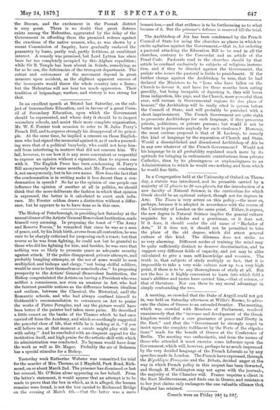The Bishop of Peterborough, in presiding last Saturday at the
annual dinner of the Artists' General Benevolent Institution, made himself very amusing. In proposing the toast of " The Army and Reserve Forces," he remarked that since he was as a man of peace, and, by his Irish birth, averse from all contention, he was sure to be sharply criticised for proposing such a toast; but that averse as he was from fighting, he could not but be grateful to those who did his fighting for him, and besides, he was sure that nothing was so likely to promote peace as adequate security against attack. If the police disappeared, private attempts, and probably bungling attempts, at the use of arms would be soon multiplied, and bishops and clergy, "not being skilful soldiers, would be sure to hurt themselves or somebody else." In proposing prosperity to the Artists' General !Benevolent Institution, the Bishop congratulated the Artists on having a President who was neither a connoisseur, nor even an amateur in Art, who had the faintest possible notions as the difference between idealism and realism, between the Classical, the Historical, andl the Romantic schools, and who had always confined himself to -Goldsmith's recommendation to conversers on Art to praise the works of Pietro Perugino, and say the picture would have been better if the painter had taken more pains. He described a little sunset on the banks of the Thames which he had once carried off from the Academy, and which so soothingly suggested the peaceful close of life, that while he is looking at it, " if you will believe me, at that moment a curate might play with me with safety." And he concluded with an eloquent appeal for the institution itself, and high praise for the artistic skill with which its administration was conducted. No layman would have done the work as well as Dr. Magee. Probably the air of Bohemia has a special stimulus for a Bishop.


































 Previous page
Previous page